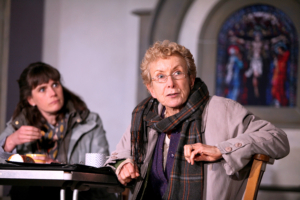Review: OUR CHURCH, Watermill Theatre

![]() The heating won't work, the treasurer's in The Maldives and there are cows fertilising the graveyard rather too directly. Indeed - the warp and weft of church committee meetings in villages all over England (where this play has toured before its arrival at the beautifully appointed Watermill Theatre).
The heating won't work, the treasurer's in The Maldives and there are cows fertilising the graveyard rather too directly. Indeed - the warp and weft of church committee meetings in villages all over England (where this play has toured before its arrival at the beautifully appointed Watermill Theatre).
So far, so so so, but all that changes when June - bright-eyed, idealistic and progressive (well, progressive for rural Middle England) - proposes Tom as a new member for the moribund committee, partly because beggars can't be choosers, but also because her Christian beliefs compel her to do so,
Tom is on The Register, tolerated, but not embraced, by the tight-knit community and spiralling into isolation. June knows that a person needs more than a place at the back of the pews and a "Good Morning" without eye contact to live - she has the proof.
Anne, a stalwart of the committee for decades and the weather vane of village opinion, was never going to get on with June, with her city ways and all that, but though her reaction to the proposal is as negative as one might expect, it is also unnecessarily, uncharacteristically cruel - there's something beneath the surface driving such an emotional response.
Marietta Kirkbride's play is a lesson in the power of drama to engage through the quality of writing delivered by accomplished actors. There are few settings from which an atheist city boy like me would feel more distanced, but within a minute or two, I was in the room with them, wrestling with the dilemma, having my sympathies torn this way and that.
Kirsty Cox invests June with that breathless enthusiasm that often accompanies a person on the edge of embracing "the saviour complex". There's a sense that the sands of time are falling through her fingers, pushing her to make a stand - and it's no surprise really.
Robert East, doubling wonderfully well, plays the avuncular vice-chair of the committee Michael, the kind of salt of the earth steady hand that all such groups need. Always ready with a quip or story to unruffle feathers, he's no leader and defers to the stronger-minded women around him.
As the desperate Tom, East catches the over-eager conversation, finds the emptiness in his soul where the love should be and gently shows us how the continuous regret is eating through Tom's mental resources. East's best work is done silently, in the grimace of reaction, in the downcast eyes.
Susan Tracy carries the heft of the plot, her portrayal of Anne drawing gasps of shock around me as the audience realise that she really will go there, but the essential sense of empathy is never quite demolished by the scowls, the short manner and the vicious words. "There but for the Grace of God..." informs the performance, which could easily have become a caricature were that sentiment missing.
With a minimal set (the production toured village halls before arriving in Newbury) there are times when it feels like a radio play - but that minimalism merely heightens the tension attendant on the moral dilemmas. Perhaps too, the fact that some audiences may not be regular theatregoers led to a touch too much exposition, especially in the second act when Tom and Anne talk through their issues - the beautifully written first half having told us much of what we need to know.
That said, Our Church is unafraid to take a hot button issue and examine the consequences of applying competing moral principles to it. And it's brave enough to send its audience back into their communities without glib answers, with more questions than they had two hours previously and with a reminder that good people can make very bad choices with the consequences resonating through time.
Our Church is at the Watermill Theatre until 20 July.
Photo Philip Tull
Videos
.png)